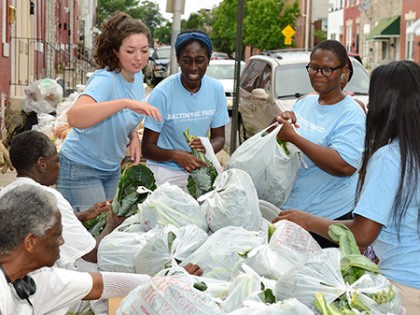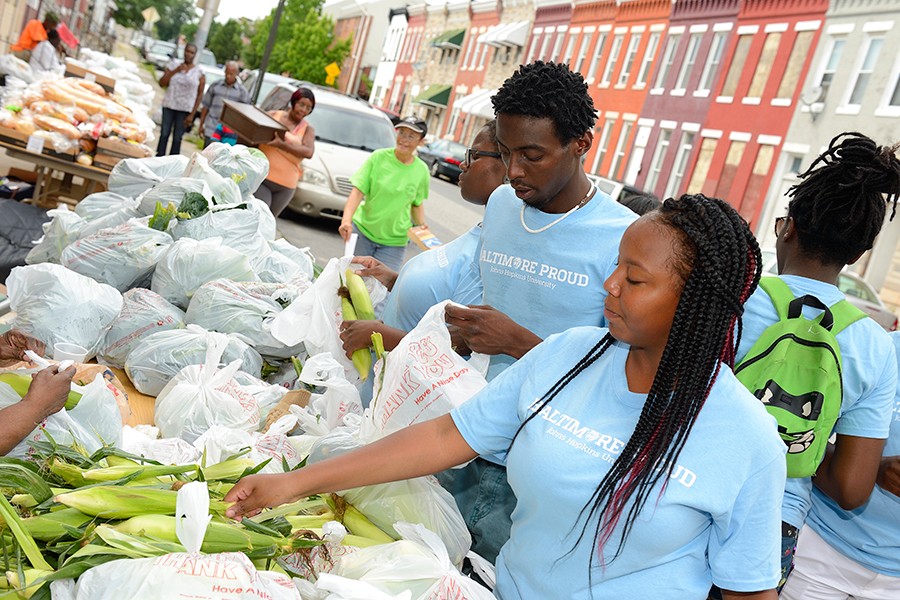The conversation starts with a knock on the door, or a greeting at a public spot like a basketball court. After introductions, the first line of questioning is, "What's your life story?"

Image credit: Will Kirk / Johns Hopkins University
What the "Hearing Their Voices" project is finding is that people want to talk. The free-ranging conversations researchers are having with young residents around Baltimore usually last about two hours. One lasted four.
The research team, under the umbrella of the Johns Hopkins University's 21st Century Cities Initiative, has been moving across Baltimore neighborhoods from east to west, giving residents ages 16 to 24 a chance to share their perspectives. Team members are dropping by homes, rec centers, and community hubs looking for young people willing to open up about their daily lives and, in particular, their experiences with the criminal justice system.
It's one of several rapid response research projects launched by Johns Hopkins after the April 12 death of Freddie Gray and the protests, unrest, and national media attention that followed.
Researchers are focusing on the area around Mondawmin Mall, where police in riot gear clashed with adolescents in late April, as well as the Morrell Park and east Highlandtown neighborhoods.
Through the project, the team has also formed some stronger connections in the communities they've been working in. In Penn North, for example, they got acquainted with neighborhood fixture Sister Tanya White of the Gethsemane Baptist Church. In July, the team members volunteered at one of the church's regular food outreach events; they planned to return later to conduct interviews with young parishioners there.
The goal is 60 interviews total, to be transcribed and shared with the public—including those in the communities.
The conversations are revealing that Freddie Gray's story and the events that followed remain fresh in these young people's minds, though some have admitted, "I've never actually talked about what happened in April," says team member Janice Bonsu, a recent Hopkins grad who served as Student Government Association president. One teen told her: "People have told me what they think I should feel, but nobody has actually asked me how I really feel."
At the same time, researchers have also learned that for many, Freddie Gray's death isn't necessarily the lightning-rod moment the media has made it out to be.
"The problems didn't start or end with respect to the Freddie Gray situation," says Monica Bell, a Harvard PhD candidate who teamed up with Johns Hopkins researchers to help lead the study. "A lot of people are saying that's not the moment when they realized this is a problem."
Bell got involved with the project through her Harvard affiliation with Kathryn Edin, a sociologist in JHU's Krieger School of Arts and Sciences who directs 21st Century Cities. The interdisciplinary effort works on solutions for revitalizing American cities, including but not limited to Baltimore. With the rapid response projects, Edin is overseeing the qualitative side with sociology professor Stefanie DeLuca.
On the ground, the "Hearing Their Voices" team numbered about a dozen this summer, a mix of high-schoolers and 20-somethings from Baltimore communities, alongside college interns from Hopkins and elsewhere. At Gethsemane Baptist, Sister White noted that their youth helps lead to more candid conversations. "It's easier to talk to someone of a similar age," she says.
A ceremony in early August on JHU's Homewood campus marked the end of the summer's research for some interns, with presentations of some preliminary findings. But the project will continue through fall with most of its team intact, Edin says. They'll continue to share information through public forums and other outlets, possibly publications.
"We're hoping to be able to add the perspectives of youth—in their own voices—to the public debate" through both academic and non-academic channels, Edin says. She says the research could expand over the year to include shopkeepers and other local stakeholders. The project is housed at the Poverty and Inequality Research Lab at Johns Hopkins, which encourages collaboration between faculty and grad students.
Community events and engagement are also a critical piece of this project, Edin notes.
"This is not just a one-way exercise," she says, "but really a two-way exchange."
Posted in Politics+Society, Community
Tagged sociology, community, baltimore, kathryn edin, 21st century cities, baltimore unrest









